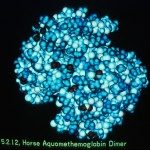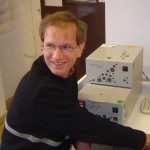Lien vers Pubmed [PMID] – 17542920
Mol. Microbiol. 2007 Jun;64(5):1274-88
Clostridium difficile, an emerging nosocomial pathogen of increasing clinical significance, produces two large protein toxins that are responsible for the cellular damage associated with the disease. The precise mechanisms by which toxin synthesis is regulated in response to environmental change have yet to be discovered. The toxin genes (tcdA and tcdB) are located in a pathogenicity locus (PaLoc), along with tcdR and tcdC. TcdR is an alternative RNA polymerase sigma factor that directly activates toxin gene expression, while the inverse relationship between expression of tcdR, tcdA and tcdB genes on the one hand and tcdC on the other has led to the suggestion that TcdC somehow interferes with toxin gene expression. This idea is further supported by the finding that many recent C. difficile epidemic strains in which toxin production is increased carry a common tcdC deletion mutation. In this report we demonstrate that TcdC negatively regulates toxin synthesis both in vivo and in vitro. TcdC destabilizes the TcdR-containing holoenzyme before open complex formation, apparently by interaction with TcdR or TcdR-containing RNA polymerase holoenzyme or both. In addition, we show that the hypertoxigenicity phenotype of C. difficile epidemic strains is not due to their common 18 bp in-frame deletion in tcdC.



